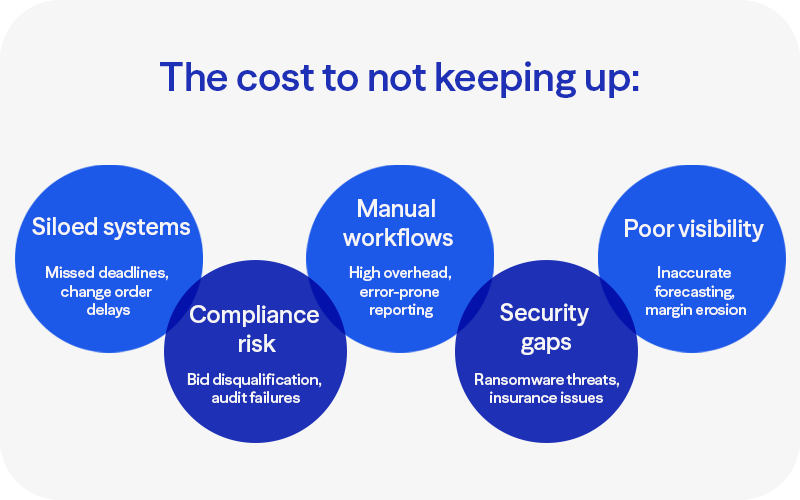Key Takeaways
- Disconnected and outdated systems create inefficiencies, costing construction companies productivity and significant financial losses.
- Modernizing technology through integration, data standardization, and strategic alignment leads to improved workflows, visibility, and operational performance.
- Effective change management is essential for successful technology adoption and lasting business impact.
Construction companies are implementing technology as a means to maintain a competitive edge and solve challenges. And while construction is modernizing, 30% of construction organizations are still building the future on outdated systems.
Construction hasn’t fallen behind because it lacks technology; it’s fallen behind because that technology doesn’t work together. Up to 90% of IT budgets go to maintaining outdated systems.
Disconnected systems force teams to rekey information, reconcile spreadsheets, and make decisions without real visibility.
The Cost of Technology Debt
Technology debt is what happens when you delay modernization. Instead of upgrading systems strategically, you add tools reactively, patch over gaps, and rely on staff to fill in the gaps.
Forty-three percent of construction companies say their business processes would improve with better access to real-time and historical data. Yet many still reconcile reports, use disconnected systems for estimating, and struggle with billing. It’s a situation that can end up costing as much as $250 million annually.
With standardized data capture and a single source of truth, organizations can address issues, streamline operations, and enhance decision-making. Research suggests efficient data capture and standardization can result in a 13% savings on total construction project spending.
- Dive Deeper: Blueprinting a Better Data Strategy in Construction

Outdated Systems Hold Back Growth
Manual time tracking, disconnected claims workflows, and multiple logins across platforms lead to delays, errors, and lost revenue. Worse, they make it harder to scale operations efficiently or respond to changing workforce dynamics.
Further, rework, delays, and missed deadlines cost the construction industry $31 billion in lost productivity annually. Most operational teams are stuck reacting to these challenges, rather than operating proactively, with studies showing that 70% of time is spent on non-value-added tasks.
In construction, technology debt and outdated systems are causing inefficiency, limited functionality, and missed business opportunities. According to Gartner, software switches are happening because their current systems don’t save them time (49%), lack specialized construction functionality (26%), and often lead to underbidding and loss of job tracking (9%).
Successful operational leaders identify issues early, coordinate resources seamlessly, and make the most proactive decisions based on strong data.
Here’s what operational performance efficiency looks like:
- Automated daily field reporting tied directly to job cost and schedule
- Centralized communication between PMs, supers, and finance
- Consistent workflows that eliminate redundancy and reduce rework
Technology Optimization
When it comes to optimizing and modernizing your technology, look for:
- Strategy alignment. Align technology investments with business outcomes, including margin protection, schedule reliability, cash flow, and growth.
- Tech debt reduction. Resolve short-term fixes and look for redundant tools that perform similar functions. Combining overlapping technology can streamline processes and reduce costs.
- Consolidation and integration. This can simplify technology management and minimize the complexity of your tech stack. Look for platforms that share data to break down siloes.
- Change management and ROI tracking. Define rollout phases, champions, training plans, and KPI dashboards. Measure adoption and outcomes like invoice cycle time, change order accuracy, and job margin.
Don’t forget to align leaders around outcomes.
It’s not about new software. It’s about visibility, control, and smarter execution across the business.
It’s Time for Proactive Modernization
Once you have the right technology in place, it’s time to be proactive. Here’s what future-ready firms are doing:
Operations
- Automating field reporting tied to job cost and schedule
- Using real-time dashboards to spot red flags early
- Streamlining communication between PMs, supers, and finance
Finance
- Standardizing reporting and compliance workflows
- Connecting time, materials, billing, and forecasting
- Getting out of spreadsheets and into insight-driven decisions
Fifty-four percent of financial leaders say data silos are a significant barrier to innovation.
Technology
- Replacing legacy systems with secure, scalable platforms
- Implementing MFA, encryption, and access control across apps
- Building an integrated data environment that supports growth
Real-World Example: Fragmented Systems Hide Process Inefficiencies
Here’s how hidden inefficiencies often surface when systems and teams aren’t aligned. One client needed help with pain points in their accounting processes — specifically invoice delays and vendor confusion. But the real issue wasn’t just in AP:
- Invoices were held up by missing purchase orders and inconsistent shipping info
- Over 50 purchasing card users and a decentralized approach created chaos in approvals
- No central oversight meant missed pricing leverage and limited vendor accountability
The Solution?
By centralizing purchasing, standardizing processes, and activating an ERP module they already owned, the client:
- Automated vendor onboarding
- Streamlined invoice approvals
- Improved visibility and vendor management
- Reduced manual work across departments
Real-World Example: Real-Time Visibility Without Added Cost
One construction company came to us because they needed a mobile-friendly time entry solution for field staff but didn’t want to pay for additional Salesforce FSL licenses just for temporary workers.
We built a custom mobile time entry solution that:
- Enabled workers to log time directly from the field
- Integrated seamlessly with payroll and job costing systems
- Eliminated the need for FSL licenses for temp labor
The Result?
Real-time visibility into labor costs, faster decision-making, and significant cost savings on platform licensing.
Making Your Tech Stack an Advantage
Technology in construction is often underutilized or overly complex.
Consider this:
- 39% of clients have multiple tools performing the same function
- 35% report poor adoption of technology investments
- 31% say tech spend exceeds ROI
A modern tech stack isn’t just about automation. It’s about enabling the people closest to the work to act on the right information at the right time.
Some of the most impactful gains come from focused, strategic updates, such as:
- A custom mobile time entry interface that improves labor reporting accuracy
- Automation that halves claims processing time and minimizes errors
- Payroll integrations that close labor data gaps and enhance financial reporting
The reality is, modernizing your operations isn’t just about technology. It’s about reshaping how your business works to unlock agility, control costs, and scale efficiently. Construction firms that align operations, finance, and technology will outpace competitors, protect margins, and build future‑ready resilience.
At Eide Bailly, we help construction firms transform disconnected efforts into integrated, scalable performance. Let’s build smarter together.
Our Work in Action
- Alliance Partition Systems Turns to Eide Bailly for Business and Accounting Expertise in the Construction Industry
- How ESI Modernized Operations with Microsoft Power Platform
- How Data Transparency Drives Innovation at Building Zone Industries
Frequently Asked Questions
Where do we start with digitalizing construction operations?
Begin with a workflow and data audit, then select integrated platforms that reduce manual handoffs and errors.
Why does integration matter more than adding new tools?
Without shared data, departments rekey information; integration improves efficiency, compliance, and visibility.
How do we ensure adoption?
Use a change management plan: champions, role-based training, phased rollout, and measurable KPIs.
What are the signs of technology debt?
Poor visibility, people acting as the “integration layer,” high maintenance costs, and rising cyber risk.
What data improvements drive ROI?
Standardized capture, single source of truth, and automated sharing across finance/operations/field.
Can we modernize without disrupting projects?
Yes — pilot integrations, then phase deployment while maintaining legacy stability until cutover.
How do we align modernization with sustainability goals?
Build emissions tracking into data collection and dashboards to meet reporting expectations.
Who should own the program?
Cross functional leaders in finance, operations, and IT, with executive sponsorship to unblock decisions.
How much can better data save?
Efficient standardization and capture can save ~13% of total project spending.
Is cloud migration too risky for construction firms?
Not with the right safeguards; invest in security baselines and staff awareness to reduce exposure.
What if our stack is fragmented?
Address technology debt by consolidating, retiring, and replacing legacy tools strategically.
Which KPIs should we watch as we modernize?
Job margin, change order accuracy, schedule reliability, carbon metrics, and cyber incident rates.
How do we avoid rework in adoption?
Phase rollouts, train champions, and measure outcomes with dashboards that guide decisions.
Blueprint a Better Data Strategy in Construction

Construction & Real Estate
Who We Are
Eide Bailly is a CPA firm bringing practical expertise in tax, audit, and advisory to help you perform, protect, and prosper with confidence.



